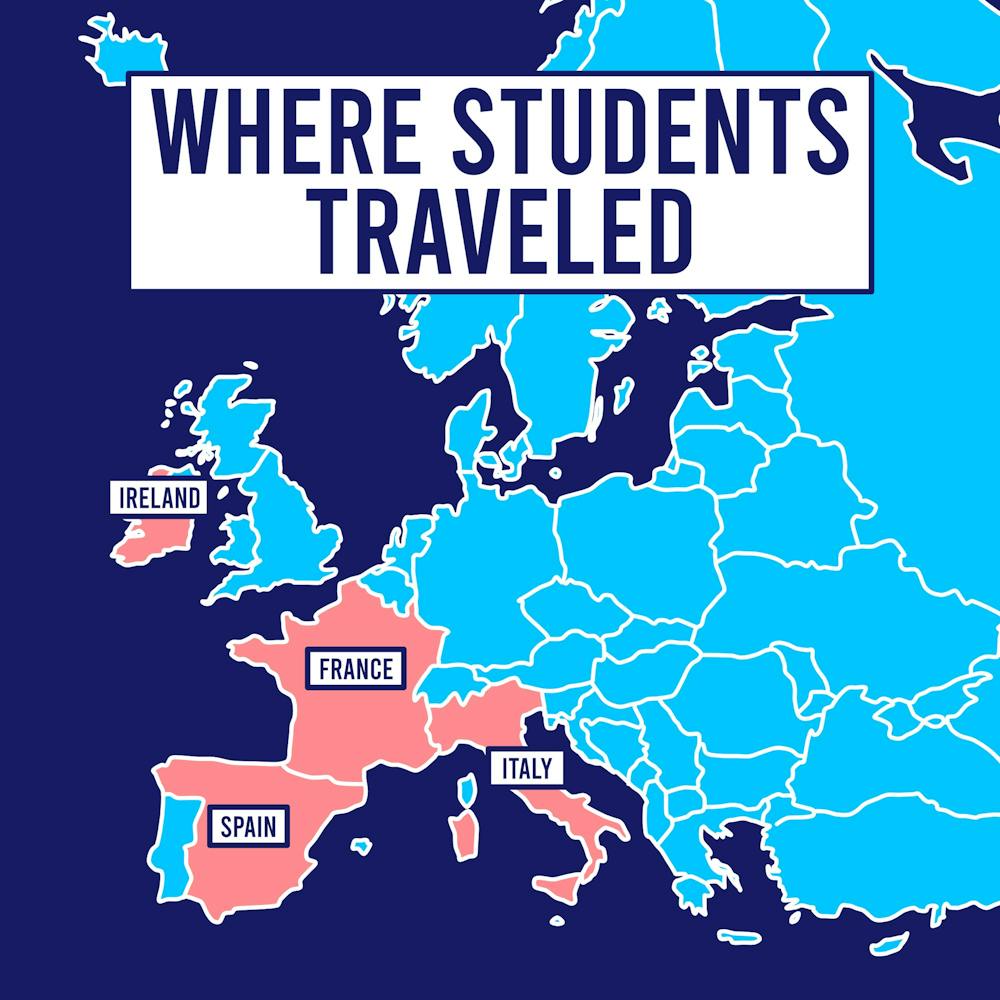It was roughly 2 a.m. on March 12 when third-year broadcast journalism student Peter Smith watched a wave of USC students run out of a Barcelona club. Shrieking and in tears, he said, they flooded the beach and began searching for flights as prices rapidly increased.
"We all knew that Trump was giving a speech that night, but before I realized why everyone was on the phone with their parents, it was the craziest thing I have ever seen,” Smith said. “You would’ve thought a terrorist attack or something had happened because in a matter of seconds everyone just freaked out, and it was just — it was mass hysteria.”

Smith was one of many USC students in Europe when President Donald Trump announced the travel ban, a preventative measure against the spread of COVID-19. The ban was to go into effect two days after the announcement.
First-year environmental studies student Janie O’Shea was in France with a group of seven other students on a university-sponsored trip. French communication and culture, a two-semester Honors College course taught by Professor Lara Lomicka Anderson, culminated in a spring break trip in which USC students visited French students with whom they had been communicating since August. The French students visited USC in February.
Though US citizens would be allowed to reenter the country, O’Shea said she initially panicked when reading headlines.

“I woke up and just glanced at my phone and was like, ‘Oh my gosh, what?’” O’Shea said. “I had texts, and phone calls, and my dad had woken up in the middle of the night and was frantically texting me, and I was like, ‘Oh my god, what is going on?’”
O’Shea said Lomicka stayed “cool, calm and collected” after the announcement, easing the nerves of students on the trip.
“My immediate response was to remain calm and gather all the facts,” Lomicka said in an email interview. “It was stressful at times – France is 5 hours ahead of the U.S. due to daylight savings time so key information was at times dispersed when we were sleeping. I have been leading study abroad trips to France for over 20 years so I had no fear of being in France. I knew we would be taken care of no matter what happened.”
Third-year visual communications student Sophie Bello was in Florence when she heard about the travel ban.
She was “one of the last people to leave,” staying in Italy until the country was about to close its borders. Even then, she flew to Amsterdam with a plan to spend two weeks traveling around Europe.

“It didn't really seem like it was that serious” Bello said. “As soon as the Northern region got quarantined, a couple schools pulled their students from Italy, no matter where they were, and that was kind of the first time that I realized, ‘Oh, wait … I could actually have to leave.’”
Smith, who booked his trip back in December, said he hadn’t considered the possibility of a travel ban when he left for Europe. His main concern was having a higher risk of contracting the virus, a concern that caused three of his eight-person group to cancel.
Despite the risk, he decided not to cancel the trip due to his financial investment and because he didn't want to disappoint his friends, whom he was visiting abroad. Smith said his parents supported the trip but urged him to be cautious and continue to check for travel warnings on the Center for Disease Control and Prevention website.
Third-year journalism student Andrea Betancourt said she continued to consult the CDC website before visiting her boyfriend in Spain. Although her mom asked her to "consider canceling," Betancourt decided she would follow through with the trip as long as Spain was not added to the website. Within a week of arriving in Madrid on March 6, Spain went from unlisted to level 3.
“With the ordering of the closure of restaurants and bars and all of the public meeting places, it felt very dystopian, kinda post-apocalyptic because there's no precedence for this right now in the world,” Cameron Beach, a third-year global studies student, said.
Betancourt said she and Beach, her boyfriend, decided to leave the day the travel ban was announced. Unable to redirect their existing flights to get home before the travel ban went into effect, the two spent $2,500 on new flights. She said they were supposed to arrive home March 14, but they learned when they arrived at the airport the new flight had been canceled and rescheduled so they would arrive on March 17.

Bello said she faced a string of flight cancellations. She said the airports were empty, the only passengers being American citizens struggling to get home. Along with Bello, O’Shea and Betancourt also voiced concern over the airport screening process on their way back into the US.
“We’re not worried if we do catch it, which at this point we do realize that it’d be a f—ing miracle if we don’t have the coronavirus 'cause we’ve been just all over the place. We were in an airport for, like, eight hours for no reason,” Betancourt said. “Our worry is if one of us has it and we aren’t symptomatic; like, we don’t show symptoms for it. We’re worried that we could get other people sick without knowing.”
According to Betancourt, who has since returned home, people are not taking coronavirus as seriously in the US as in Europe, treating the shift to online classes as an extended spring break to gather with friends.
O’Shea said her time abroad developed her perspective on the pandemic.
“At the beginning of the trip, people were all joking about it because the coronavirus just didn’t seem real, and we had not been affected by it personally," O'Shea said. "Towards the end of it, we all recognized how serious of a threat it was.”
— Rita Naidu contributed to the reporting of this story.
Editor's note: Smith and Betancourt are both members of Student Gamecock Television, a branch of Garnet Media Group. The Daily Gamecock is also a branch of Garnet Media Group.

